Bust out your Trapper Keepers and get this all down in your calanders!

This year, we’re going to have 11 showdowns at Scriptshadow. If you’re new to the site, a Showdown is when you send me a writing sample, I pick the best entries and post them on the site, then you guys spend the weekend voting on your favorite entry. The winning entry then gets reviewed on the site.
Normally, I’d announce each Showdown the month before. But I want everyone to have that information ahead of time so that you can prepare the best submissions possible.
We’re going to start off with one of my favorite showdowns to run, the LOGLINE SHOWDOWN. Except there’s a little twist! Instead of only submitting one logline, you must submit FIVE loglines. I will choose your best logline. That logline will be officially entered into the competition. I will then choose ten loglines to compete in the showdown.
As a bonus, even if you don’t make the cut, I will tell every single person who enters what their best logline was. The secondary goal of this showdown is to find your next script to write. So, at the very least, I’m going to tell you which of your five ideas you should turn into a script.
JANUARY – 5 LOGLINES SHOWDOWN
What: 5 Loglines Showdown
When: Friday, January 30
Deadline: Thursday, January 31, 11pm Pacific Time
Submit: 5 loglines, each with a title and a genre
Where: carsonreeves3@gmail.com
Okay, let’s move on to the rest of the showdowns
FEBRUARY – FIRST PAGE SHOWDOWN
Not enough writers understand the art of keeping the reader’s attention. They write for themselves rather than placing themselves in the minds of their readers and asking what would entertain them. That first page tells the reader SO MUCH about you. Namely, it poses the question: Would you keep reading? Would we?
MARCH – SCENE SHOWDOWN
Scene-writing is script-writing. You cannot write a script until you first understand how to write a dramatically compelling scene with a beginning, middle, and end. Something that conveys character wants. Something that shows you understand how to inject conflict into a scenario. Most of all, a scene displays whether you know how to be entertaining. This is your chance to prove all that.
APRIL – TWIST ENDING SHOWDOWN
I felt like we needed to have fun with a couple of these showdowns so these next two are, admittedly, different. You will write a short script that MUST HAVE a twist ending. Twist endings are super hard to write but when they work, they turn a script into a must-read.
MAY – CHARACTER INTRO SHOWDOWN
I thought we all knew how important introducing a character was. Yet I continue to read scripts with weak character intros! This is your chance to change that. If I told you that you had to create the best character in cinema history, what kind of first scene would you write for them? I’d imagine it would be amazing. Well, that’s how you should approach every one of your protagonist intros.
JUNE – MEGA-SHOWDOWN RETURNS!!!
Mega-Showdown returns! 10 uninterrupted days of showdown madness on the site. This was my favorite two weeks on Scriptshadow last year so I’m excited to see what happens next. If you haven’t already started on something, you should start the SECOND you get my reply e-mail about which of your five loglines is best.
JULY – HIGH CONCEPT LOGLINE SHOWDOWN
After you finish a script, the very first thing you need to do is COME UP WITH YOUR NEXT IDEA. Hollywood waits for no one. You must keep generating material. This logline competition, however, is going to be high concept only. No sad Alaskan coming-of-age concepts. Only stuff that results in anime eyes from any producer who looks at it.
AUGUST – DIALOGUE SHOWDOWN
Write a scene that is dialogue-driven! I might even impose limitations of allowing a minimal amount of description. The scene’s value must exist solely on the ability to write great dialogue. Better get that Scriptshadow Dialogue book if you hope to stand a chance!
SEPTEMBER – OPEN SHOWDOWN
I’m still not sure what I’m going to do for this month yet. A couple of options are a Second Chance Showdown (for entries that were solid but didn’t make the Mega-Showdown cut). Short Story Showdown. Interpretation Showdown (I post a short script idea and everyone writes their version of it). I’m open to other ideas so feel free to suggest stuff in the comments!
OCTOBER – HORROR SHOWDOWN
It’s been a while since we’ve had a genre-specific showdown and what better month to bring it back than October! When Halloween is in the air. Poe will be thrilled. Scott will be furious. But, in the end, we’ll all be happy if we find a great horror script. :)
NOVEMBER – AI PITCH SHOWDOWN
A part of me doesn’t want to do this showdown but I think it’s necessary if we don’t want to be left behind. By the end of this year, I believe screenwriting will begin to heavily incorporate AI to bring in a more visual element when pitching our stories. So, I want to do a showdown where you pitch your movie idea using the available AI tools out there (image generation, video generation). Whoever wins, I will review their script (yes, this can include scripts that didn’t make the Mega-Showdown). I know there will be a lot of questions about this one. We’ll answer those questions as we get closer to November.
And there we have it. A year’s worth of screenwriting battles. I can’t wait! Can you??

Welcome to 2025!
Tomorrow, I will list the 11 SHOWDOWNS that we’re going to have this year on the site. Because I know how impatient you all are, I’ll give you a quick preview.
Our first showdown, which will happen on January 23rd, is going to be LOGLINE SHOWDOWN.
But it comes with a twist. You are not going to send in a single logline. You are going to send in FIVE loglines. I’ll decide which one is best. I will then post the 10 best loglines (from those top choices) that were submitted and all of you will vote.
Now, there’s a reason I’m doing this. We often get obsessed with a single idea. So much so that it’s impossible for us to receive criticism regarding that idea. We see it all the time in the comments. Someone posts a logline. Others don’t like it. The writer becomes fiercely defensive and everyone goes home angry.
I understand defending one’s idea. If we weren’t personally attached to what we wrote, what we wrote would probably suck.
But, the other day, I saw that one of you posted how John Hughes used to come up with hundreds of ideas a year so that he was only picking the best of the best to make movies from.
I want to use that same approach here. Instead of becoming attached to one idea that may be bad, I want you to generate multiple ideas. This will create less of an attachment and allow you to be okay with others judging them. Also, a lot of times what will happen is that a throwaway idea will end up being your best one.
This happens all the time in pitch meetings. The writer comes into the studio to pitch his slam-dunk idea. It’s immediately clear the executives aren’t into it. He pivots to another idea. They don’t like that one either. He then pitches some throwaway idea he came up with a couple of weeks ago and, bam, the execs are hooked.
So, if I were you, I would start generating five loglines A DAY leading up to January 23rd, Logline Showdown Day. Send me the top 5 of those 100 loglines. If you do that, you should have one good movie concept in there. If all this goes as planned, we’ll have the most competitive Logline Showdown ever.
And this is all part of a bigger plan. I will tell EVERYBODY who submits loglines, whether they get chosen or not, which logline was their best one. There will be a major Script Showdown announced tomorrow. I would then prefer that the entry for that showdown be your best logline.
I always say never to use flashbacks so I don’t know what it says that I’m violating my own rule.
BUT…
I did catch up on the last few movies that I missed last year and I wanted to give you my thoughts about them. Keep in mind that I saw faults in all of these movies from afar, which is why I didn’t see them when they came out. Therefore, I was predisposed to disliking them. I’ll start with the worst and move my way up to the best.
Elevation

What’s interesting about this movie is that this is the type of script I tell you guys to write. In fact, there’s a good chance this logline would’ve finished high on this month’s Logline Showdown. After a worldwide invasion by mysterious monsters, humanity’s only safety is to move up to a higher elevation, where the monsters can’t survive. In this case, that’s 8000 feet.
It comes from the same producers of A Quiet Place so it has that same high concept feel to it. But this movie was no Quiet Place.
I knew it was in trouble when the main plot revealed itself. This community lives in a safety zone above 8000 feet. The main character’s son has health issues. They run out of medicine for him so they have to head to the city to get more. The city, of course, is below 8000 feet. That’s your movie.
The “go get medicine” trope is so played out that you can’t use it as a main plotline. You can use it as a subplot in, say, a TV show, which shows like The Walking Dead do all the time. But it can’t be your main plot. That’s about as lazy of a creative choice as you can come up with. You need to be more original.
But the bigger issue here is that you could tell they didn’t have enough story. There were tons of scenes with characters sitting around, sharing difficult moments from their pasts, or talking about their feelings. A good script should never feel like it’s biding time. It should feel like there isn’t enough time. When you have to write scenes to stretch your script out to an acceptable length, your script is dead in the water.
But are you ready to get mind-f*%&ed? I would still tell you to write this script. You know why? Because you’re reading a review of the movie. Which means it got made. Which means that EVEN THOUGH they had a bad script, they still made it. Why? Because it was a high concept. High concept stuff is more likely to get made, which means you don’t need to execute the script perfectly to get traction with it.
Saturday Night
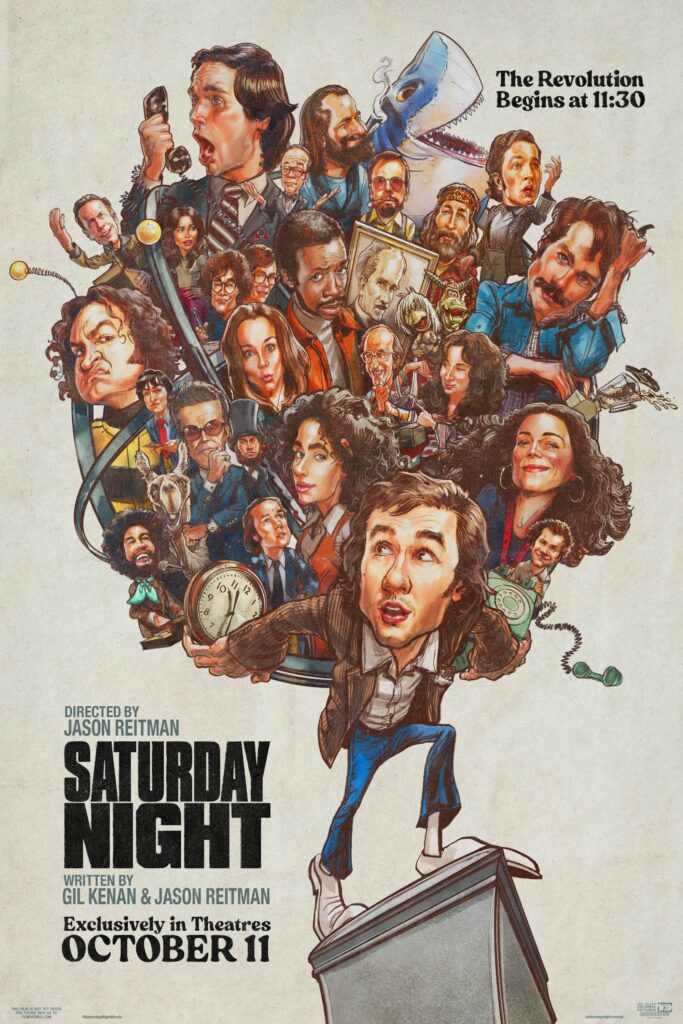
There is NOBODY who likes a real-time concept more than me. I’m of the belief that the tighter you make your timeframe, the more urgency and tension you pack into your script. You do yourself so many favors with this format cause it hides a lot of the problems that come up in a script otherwise.
Jason Reitman has me rethinking that opinion.
Saturday Night has to be one of the more frustrating movies I’ve seen in a while because, with every scene, I thought, “I *should* be liking this.” Yet I wasn’t.
You have the insane pressure of putting on a show with only minutes left to get ready and everything is going wrong. It’s complete chaos. Nobody likes each other. That’s the recipe for a tension-filled movie!
But I think I know why it didn’t work. For one, the driving force for liking this movie is understanding who’s who. It’s understanding who Dan Akroyd is. Who Chevy Chase is. Who John Belushi is.
The movie does a terrible job of conveying this. None of the actors look like their real-life counterparts. This means that older people who grew up with Saturday Night Live come away frustrated.
Then you have the younger audience watching this movie. If you don’t have any idea who these people are at all, I don’t know why you would have any interest in the film. I suppose if you made the characters fun to watch onscreen, anybody would like them, regardless of whether they’d heard of SNL or not. But neither Chevy Chase, Dan Akroyd, or John Belushi, stand out. None of them have a moment where you think, “Ooh, this character is interesting. I want to know more about them.”
But the bigger issue is that the movie decides to make Lorne Michaels (the creator of Saturday Night Live) the main character and he is the single most uninteresting character I watched in movies all year.
A good protagonist should be ACTIVE. They should be exerting themselves on the plot. This does two things. It makes us like the main character (we like people who take action) and it injects life into the plot. If the protagonist is trying to do things, he will be met with obstacles and conflict, which create drama and entertainment.
All the Lorne Michaels’ character does in this movie is stumble from scene to scene and observe what’s going on. He never does anything. He never exerts himself on the production. He does so little, in fact, that I would not have faulted a viewer for assuming he was a production assistant.
On top of this, the movie isn’t funny. I didn’t laugh once. Much of the dialogue is Sorkin’esque, the walking-and-talking million-words-a-minute style that made Aaron famous. The problem is, it’s third-rate Sorkin at best. This goes back to my complaint about The Franchise. If you’re making a comedy, you need funny people in the key positions – director, writer, actor. There were no comedians in any of those positions here. So you reap what you sow.
Nightbitch
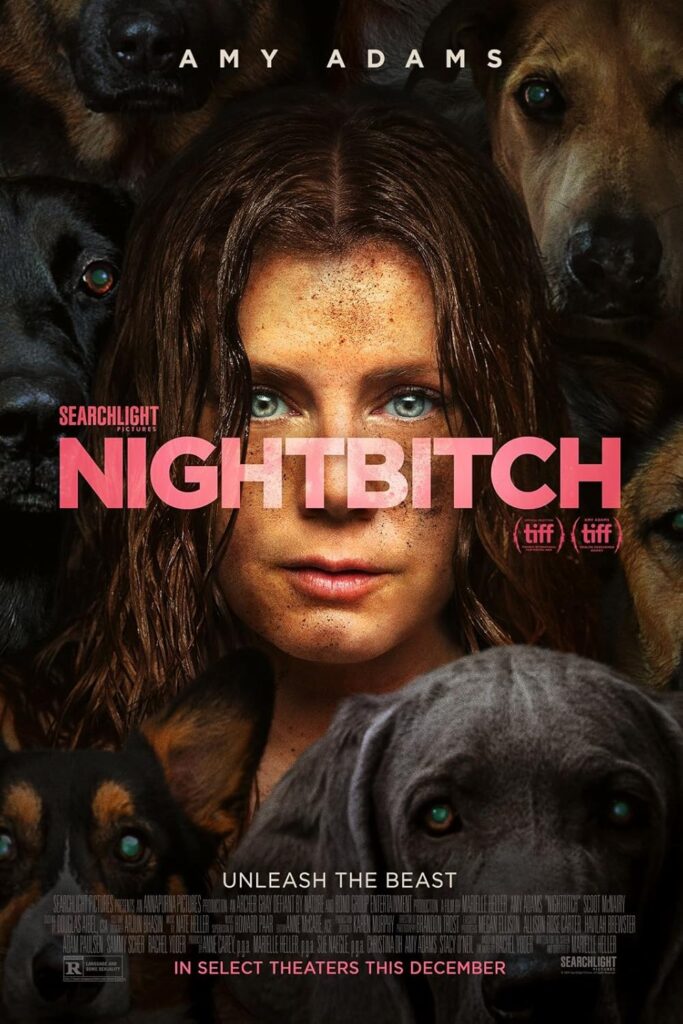
Nightbitch is one of those movies that would’ve finished top 5 on the Black List. Why? CAUSE IT’S A GIANT METAPHOR. A suburban mother who’s going insane due to her stay-at-home duties starts turning into a dog.
It’s a metaphor for… something.
The point is, scripts like this are always celebrated because intellectual types think they’re smart. They also contain an x-factor that elevates them above your typical movies that examine life.
But the script fails due to a basic problem – no plot. I see this all the time in character examinations. The writer becomes so focused on examining their main character that they forget to create a story for them to move through.
All Nightbitch does is drop us into unconnected scenes of our heroine either a) doing something with her kid, or b) doing something with her husband.
To the writer’s credit, there is a significant amount of conflict. There is conflict within our main character. And there is conflict between our main character and her husband. But you still need a plot. You still need a destination. If you don’t give the reader a destination and they, therefore, don’t know where they’re headed, it becomes very difficult for them to stay engaged.
This is Screenwriting 101. Build some GSU into your story. You may have been able to save the film.
The Order
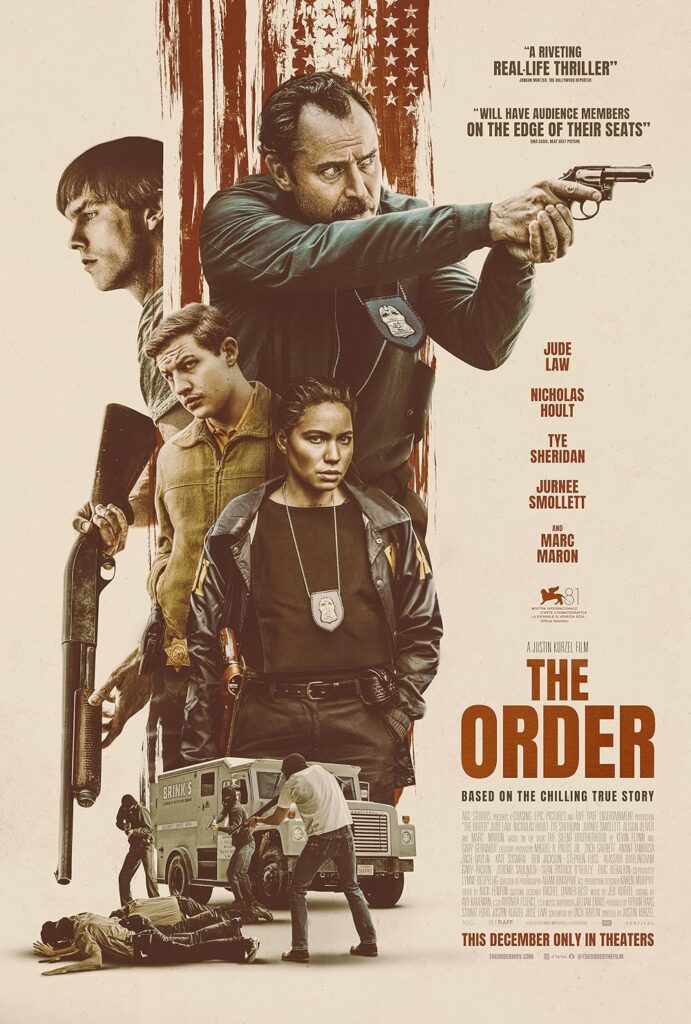
I have begun to trust IMDB ratings much more than Rotten Tomatoes ratings. Rotten Tomatoes has this movie at 91%. IMDB has it at a 6.8. In general, a 7.0 on IMDB means it’s an average movie. A 7.1 is a little better. And a 7.2 usually means it’s good. Every point higher than that means the movie is genuinely good. A 7.6, for example would equate to a genuinely awesome flick.
The Order is a 6.8 movie. It’s watchable but weak in too many key areas. It’s a confused premise. It presents as a “based on a true story” movie, set in the 70s following domestic terrorists. But it’s not true. It’s all made up. Which is strange.
Why set some fictional movie in the 70s for such a random topic? Idaho (where the movie is set) has some domestic terrorist issues NOW. So, why not set it now? It would’ve been a million times more interesting.
The seriousness with which the movie presents itself prevents any sort of excitement from unfolding. And it seems to deliberately make choices that make the movie worse as opposed to better.
For example, in an early bank robbery scene, our crew steals money from a bank and shoot off in the getaway car, celebrating their victory. Then, out of nowhere, you hear a BANG and blood splatters across everyone’s face. There’s momentary confusion as to what happened and who got shot.
But instead of telling you, the director cuts to the next scene, our bank-robbing leader arriving home with the money, covered in blood. His girlfriend says, “What happened!?” “Nothing, just an ink explosion.”
So nobody got hurt then. Oh and, also, all the money they stole was wrapped in plastic. So none of the money got hit with the ink explosion. Nobody got hurt. The ink explosion didn’t mark the money, meaning it can still be used. WHAT WAS THE POINT OF THE INK EXPLOSION THEN!!??
The movie’s shining light was its bank robbery scenes. They were the best bank robbery scenes I’ve seen in years. But there were only a few of them. Everything else about this movie plods along boringly.
Gladiator 2

Oh, Gladiator 2. This is a tough movie to talk about because it’s so decidedly average and we don’t have a community to discuss average movies anymore. Movies either need to be great or terrible. There’s no in-between.
The biggest award I can give this film is that it takes a rather elaborate plot and manages to keep it on the tracks. There’s a lot going on here. You have these co-emperors of Rome and they defeat some country in battle and they make that country slaves and they bring them to Rome and yet one of those defeated men, our hero, used to be Roman and he falls under the tutelage of some “vice” emperor played by Denzel, who turns him into a gladiator and, oh yeah, it turns out (spoiler) that he’s actually Maximus’s secret son and then Denzel takes out the brother emperors and becomes emperor himself and now he and our gladiator are enemies.
There’s a LOT going on in this plot. It’s the opposite of Nightbitch.
Despite Denzel being the best thing about the movie, the decision to hire him ultimately hurt it. Because Denzel blows everyone out of the water in every scene that he’s in in every movie. Here, he’s pitted against an actor, Paul Mescal, who’s still raw. He doesn’t yet have gravitas onscreen. The reason the first movie worked so well was because Russell Crowe was always the biggest thing onscreen. Mescal is no Crowe. And, therefore, it’s the villain, Denzel, who comes away as the biggest character in the movie as opposed to who it should’ve been – our hero.
I still think this movie is worth checking out. I liked the unique choice to make the emperor a two-headed monster. And I liked the weirdness of those characters. And, unlike a lot of the movies listed above, Gladiator 2 never gets boring. It only fails to achieve what you want it to. And maybe that’s because our expectations were too high to begin with.
Wicked
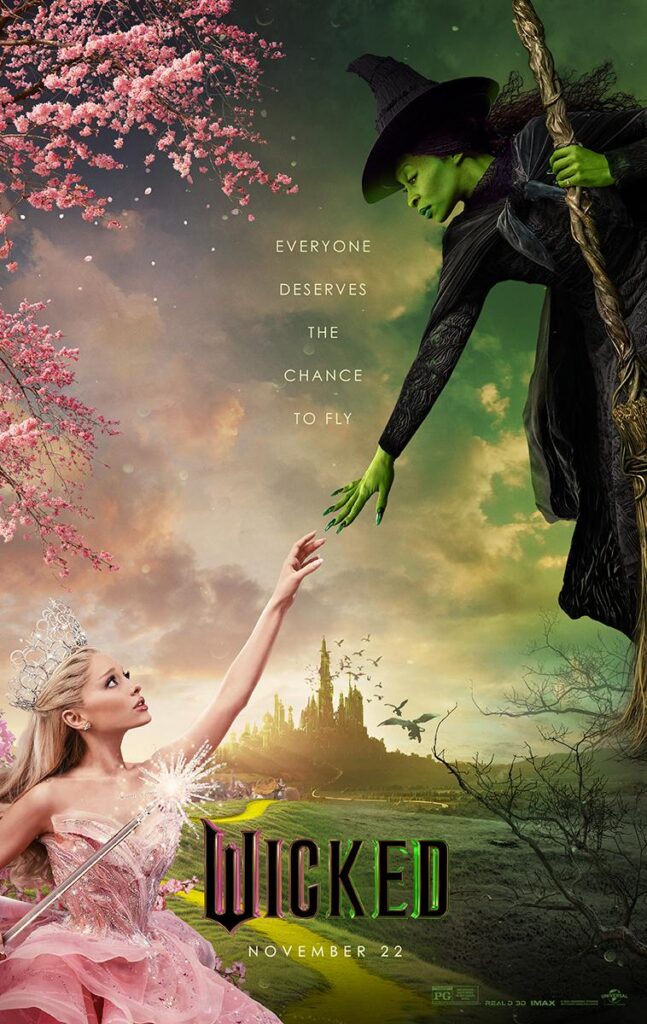
Wicked wins the “Best of the Missed Movies” list by a hair over Gladiator 2. You can always tell if a movie is “working” within the first scene. That doesn’t mean you’ll like it. But there are so many movies where the elements don’t come together in a harmonious way, leaving the movie feeling disjointed and unsure of itself.
I’m thinking of movies like The Fall Guy and If and Fly Me To The Moon and Borderlands and Megalopolis. The ingredients of these movies are all fighting against the overall product.
Not the case with Wicked. You can feel a certainty behind the film. The director, the actors, the production designers – they all knew exactly the film they were making and that confidence comes across on screen.
The actor I was most worried about was the big revelation in the film – Ariana Grande. This is because I assumed she was playing the good guy. Ariana Grande is not good! Therefore, when we learn that she actually plays the villain, everything falls into place. She is the most villainous villain of the year, both in real life and in the film. And the movie shines because of it.
The script shines the brightest by utilizing one of the most tried-and-true devices in screenwriting – a pair of characters (Glinda and Elphaba) who despise each other. Forcing two people who don’t like each other to be around one another is the dramatic gift that keeps on giving. It’s so simple yet so effective and, for me, it was what made the movie so fun. In fact, whenever the two were apart, I would eagerly wait for them to reunite. The movie was always best when they shared the screen.
That doesn’t mean there weren’t issues. The movie was way too long, an unapologetic 2 hours and 40 minutes. It certainly took its time through some sections. But I thought the movie was good overall.
Did you see any of these movies? Or did you catch up on any 2024 films that surprised you? If so, share your thoughts below! And if you want to start pitching loglines for community feedback, go for it!
The great thing about a Scriptshadow Best Movies of the Year list is that you’re not getting any b.s. All these other list-makers are giving you their cinephile-signaling choices, the movies they think they’re supposed to tell the world they like. Not Scriptshadow!
Every single pick here is, genuinely, one of my favorite movies of the year. That means you’re going to see some movies you’re not used to seeing in a Top 10. There will be complaints. There will be defiant comments written, comments that sound something like this: “That movie was garbage. It was boring and I hated the characters and you could see the twist coming from a mile away.”
Those comments? Those comments are wrong.
Every single pick on the Scriptshadow Best Movies list is, objectively, one of the best movies of the year according to moi.
Before we get to those picks, I want to comment on some movies that didn’t make the list, in case you were wondering where they were.
I haven’t seen Wicked because I assumed I wouldn’t like it. But several friends who aren’t Wickeders, or whatever you call them, saw the movie and enjoyed it so there’s an off-chance that if I saw the movie, it would make my Top 10. I finally saw A Quiet Place: Day One and it was better than I thought it would be but too flawed to make the list.
Longlegs was too “indie” for my taste. The movie felt like it needed another 20 million in budget to make the most of its potential. Smile 2 was a nice surprise. Great directing. But I definitely wouldn’t call it one of the best movies of the year.
Blink Twice was better than I thought it would be so if you haven’t seen it, check it out. Just not “best of” worthy. I absolutely positively HATE The Substance. It has permanently put me off body horror. Late Night with the Devil was probably the best surprise I had all year. Very fun movie. Nearly made my Top 10.
The Last Stop at Yuma County would’ve made the list if it extended to Top 15. A tense little thriller with great directing and good use of payoffs. As would Love Lies Bleeding, another directing tour de force. A very spooky film that makes you feel off-center from the very first scene. Oh, and Magpie! Magpie’s concept comes from Daisy Ridley. A fun little slow-burn thriller about a family that’s falling apart with a unique plotline that involves a married couple’s child landing a role in a big local movie.
Never saw Here. Never saw Monkey Man. Never saw Heretic. Of those three, Heretic is the only one that legitimately had a shot at making my Top 10.
All right, now that you know all that, time to get to the Top 10 movies of the year!

NUMBER 10 – CIVIL WAR
I watched this movie at just the right time. If I would’ve watched it when it came out, I think the hype would’ve led to disappointment. But I went in long after the movie hit streaming and therefore my expectations were low. The movie is not perfect. And, if I’m being honest, it’s slow, especially early on. But it grows on you. You start to care about the characters. And when you hit one of the best scenes of the year – Jesse Plemons killing anybody he sees fit – you’re all in. The movie then has a big finale that climaxes in the ultimate character arc. If you’re looking for a good adult movie, this is the second best option of the year. I’ll get to the first soon enough.

NUMBER 9 – KINGDOM OF THE PLANET OF THE APES
There may not have been a studio movie this year I was more convinced I would dislike than Kingdom of the Planet of the Apes. 20th Century Fox has had issues with this franchise from the start. Every single one of the movies looks the same. Every single one of these movies has a title that sounds the same. I had no interest in seeing this. But the director does an incredible job mining an emotional story from the ape characters. I was shocked at how intensely I was drawn in. It’s one of the few examples of a studio putting character over spectacle. Definitely worth your time.

NUMBER 8 – DEADPOOL AND WOLVERINE
Deadpool and Wolverine had a lot to live up to. If it would have toppled, it would’ve taken all of the 2024 box office with it. So give it to Ryan Reynolds for knowing exactly what the audience wanted and giving it to them. The thing I was most impressed by with this movie was how the character of Deadpool was in this sunny crazy kooky movie while the character of Wolverine was in this dark dusty devastating movie. And yet, somehow, they still played off each other perfectly. You know a movie is working when you don’t even care about the parts that aren’t working. For example, I have no idea what was going on with the villain in this film or what she wanted. Didn’t matter. We got Deadpool and Wolverine fighting 300 Alternate Universe Deadpools and that’s all we needed. That and Madonna.

NUMBER 7 – CONCLAVE
Conclave is a masterclass in plotting. A big part of plotting is pacing – understanding when to introduce new plot developments into the story and how frequently. Most writers wait too long to introduce the next big plot point and, as a result, their stories stall. You don’t get that with Conclave. Conclave keeps hitting you with new plot points every 10 pages. And each of those revelations either make the story more interesting, add higher stakes to the proceedings, or both. It’s a great example of how you can build an exciting plot into “small” situations. You don’t need to have Tom Cruise trying to save the world. You can build compelling plot points out of many different situations, especially high-stakes situations like needing to anoint the next pope.

NUMBER 6 – KINDS OF KINDNESS
Contrary to popular belief, I need my “weird” in my movie-watching. I don’t always want it. But I eventually crave it because I need something to balance out all the logical storytelling that dictates my taste. Kinds of Kindness gave me all of that and more. What surprised me most about the movie is that, even though it’s a compilation of 3 short stories, each of those stories is really good. Normally when writers do this, there’s always a weak story. But not here. Each one is weird in its own wonderful way. The storytelling Yorgos Lanthimos uses is one where he plops you into a story that you don’t quite understand yet and you need to keep watching to figure it out. I noticed that that device was very effective here as I always wanted to know more. I kind of wish Yorgos would’ve figured out how to make this one big movie because, that way, more people would’ve seen it. But even in its current state, it’s a gem that people will stumble upon and enjoy for years.

NUMBER 5 – THE WILD ROBOT
The second I saw this trailer, I knew it was going to be great. The contrast of this mechanical being placed in the midst of such unforgiving nature was a pot just dying to boil up plenty of drama. I was telling a writer how clever the writing was in that it could’ve been really sappy with just the robot and the little bird. But the writer, Chris Sanders, added this conniving fox to the mix and that created the perfect balance to the proceedings. The movie has these great sequences that are both cinematic and emotional. When Roz teaches Brightbill to fly, it’s total movie magic. Sanders also took a big risk by embracing maturity instead of catering to a more youthful approach. He could’ve easily pandered to children here and the film probably would’ve done a lot better at the box office. Instead, he kept it mature and, as a result, it’s going to win the animation Oscar and go down as a classic.
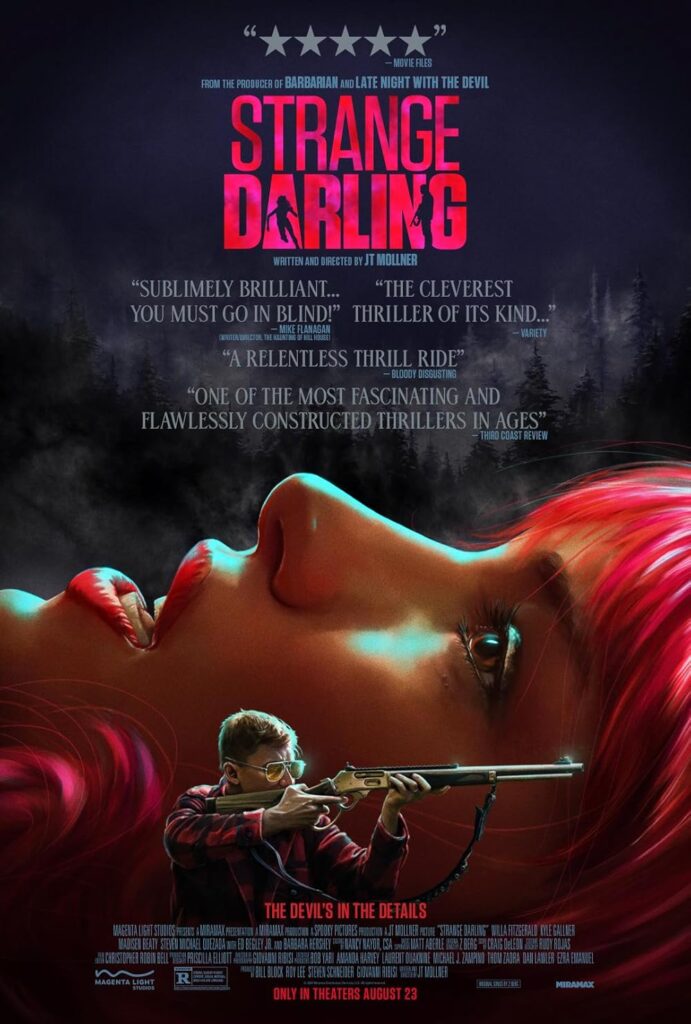
NUMBER 4 – STRANGE DARLING
It’s hard to talk about this movie without spoiling it. So, if you haven’t seen it yet, move on to the next movie on the list. Okay, spoiling commencing. Strange Darling shows that you can make a small cheap movie hit hard. One of the best ways to do this is to tap into a belief that the general audience has been conditioned to believe and then slam into them with the opposite. The last four years have been movies telling us: Men toxic, women perfect. Director JT Mollner uses that belief against you. When our evil looking dude is hunting our helpless heroine, we’re rooting hard for her to get away. That is until we find out that the heroine is the villain and the man is the hero. It’s a great midpoint twist that turns the movie into a whirlwind of emotions and momentum. Biggest surprise of the year. Didn’t see it coming.

NUMBER 3 – SPEAK NO EVIL
A few of you are probably surprised to see this movie ranked so high. So let me explain why. Speak No Evil is, in my opinion, the type of screenplay you can get the most bang for your buck out of. Because all you’re doing is putting characters in a situation. There are no monsters here. There are no shootouts. There are no car chases. It’s just a group of people, in this case a family, placed in a dangerous situation that they probably won’t escape. I love scripts like this. I love scripts that reveal things before our heroes know. Cause now you’re strictly using dramaturgy (in this case, dramatic irony) to keep the reader invested. It’s pure writing, these stories. So to see one done so well? I’m always going to celebrate when that happens. And even if you throw all the complex screenwriting terms to the side, it’s just a fun thriller. It’s tense. It’s suspenseful. It’s got a couple of great reveals. It’s got a great villain. For pure entertainment, you can’t beat Speak No Evil.

NUMBER 2 – FURIOSA
Years down the line, random people are going to stumble across this movie on streaming and wonder where it came from and how they’ve never heard of it before. It is a riveting movie. It’s also an epic story. This isn’t Mad Max. It isn’t Fury Road. It takes place over years and years. We see characters grow and mature and move their way up the ladder. We see these incredible action sequences. The best car chases you’ll see in any movie this decade. I remember watching this film and, at first, feeling that it was too clunky. But it was only because I didn’t understand how big the scope was. Every time I look back at this film, I grow more and more fond of it. It achieves that rare feat of feeling big (incredible set pieces) and small (intimate moments) at the same time. I have no idea why this movie didn’t do better. Maybe it’s because nothing in this universe could’ve looked better than that Fury Road trailer. So it was always doomed. But this movie was freaking awesome.

NUMBER 1 – ANORA
When I think of Anora, I think of one word: Energy. Every single frame of this movie is packed with energy. You don’t see that anymore. We used to get it in movies like Trainspotting and Fight Club and Amos Perros and Lock Stock and Two Smoking Barrels. We don’t see it much anymore, though. Sean Baker is one of the few filmmakers who’s able to infuse that same level of energy into every moment of his movie. Anora is a long film but it never plays like it. The entire second act is a chase where we’re always one step behind. The screenplay preys on your expectations at every single juncture. You always think you know what’s coming. You don’t. Even when we get to the ending, a time when we’re usually able to put all the pieces together, we STILL don’t know where it’s going. And it’s an amazing experience because of it. The acting is incredible. The casting is incredible. The directing is superb. Scott says this movie won’t win the Oscar because Neon doesn’t have the cash to bankroll an Oscar campaign. But I think this movie is so good that it will overcome that. Expect Anora to pick up a golden statute this March.

For a franchise that was DOA when its first trailer arrived, it’s amazing that Sonic has become such a dominant franchise that it’s now beating Hollywood juggernaut, Disney, at the box office. And not just beating it. Destroying it. Sonic 3 took in 62 million dollars this weekend whereas The Liong King prequel, Mufasa, took in a measly 35 million dollars.
It’s not just a boon for Paramount’s video game star turned movie star, it’s a likely goodbye wave to Disney’s “live-action” adaptations. Between the underperforming Little Mermaid, the failure of Mufasa, and the impending failure of Snow White, which is rumored to have cost 300 million dollars to fix all its various issues, the unexpected cash cow that is live-action adaptations is now kaput.
It’s a footnote, albeit a big one, since Disney’s Marvel franchise is no longer a guaranteed money-maker. They needed this other pipeline of profit to ward off all these new Marvel bombs that were imploding. But now that the curiosity factor is dead, the live-action adaptations have to stand on their own. And it doesn’t look like they’re able to.
Luckily, Disney still has the best catalog of films in the business and, therefore, they can churn out animated sequels that always do well. Disney *does* have two of the top five movies of the year with Inside Out 2 and Moana 2. They also have Deadpool and Wolverine, although that one comes with context since it’s not a Disney-generated movie.
Speaking of superhero films, there is no studio more dependent on the success of a superhero movie than Warner Brothers is with James Gunn’s Superman. The trailer for the new film (and the rebooted DC franchise) just came out last week and, I have to say, it is amazing.
James Gunn knows that there has to be a balance in order for emotion to connect. Because if it’s all emotion all the time, then there’s nothing to contrast that emotion with. It’s like a roller coaster that only goes down. Technically, that should be fun but the whole reason that the “down” works is because the roller coaster ever-so-slowly brings you UP beforehand. You must feel that slow suspense of the “up” in order to truly enjoy the “down.”
You also have to take risks in today’s movie marketplace to stand out. This has always been the case. But in 2024, it’s even more so, since movies aren’t just competing with other movies. They’re competing with 300 million dollar TV shows. They’re competing with the internet. They’re competing with Twitch and video games and New Jersey drones and Mr. Beast.
If you give out the same ole same ole in 2024, you’re just not going to get people talking. So for James Gunn to include a SUPER DOG in his Superman movie is insane when you think about it in a vacuum. They didn’t even try that in the original Superman movies, which came out during the height of 80s cheese. We live in a way more cynical world where the inclusion of a dog with a cape in a superhero movie could lead to a laughingstock meme that dominates the internet for the next 20 years.
And yet the “Superdog saves Superman” moment in the new Superman trailer is the most talked about thing of the Christmas season. Everyone is in love with Krypto. Including me!
The Superman trailer was good enough that I now think it could be the biggest movie of 2025. Yes, it needs to beat Avatar to do so. But it’s got a chance.
Speaking of emotion, I finally saw The Wild Robot and thought it was tremendous. One of the reasons this movie works so well is that it leans into this concept of contrast. A robot does not fit into nature. They are two opposite things. That’s what makes their combination so intriguing. Therefore, before a single plot beat has occurred, we’re already intrigued.

And the writer, Chris Sanders, leans into this idea when creating Roz’s (the robot’s) flaw. Roz is only able to think in terms of her programming. The movie is about her learning to think with her heart.
Writers get lost in this concept of character arcs. They make them more complicated than they need to be when, often, the simplistic ones are the ones that work. Character thinks logically. Character learns to think emotionally.
It really is an excellent movie and worth checking out.
But if The Wild Robot feels too juvenile for you, you’ll want to check out the most un-juvenile movie of the year, Conclave. It’s free if you have Peacock. Conclave is the best-plotted movie I’ve seen in 2024.

If you haven’t seen it, it follows the aftermath of the pope dying. A new pope for the Catholic Church must be chosen quickly, which means that all of the cardinals must hunker down and vote. If the vote isn’t supported by two-thirds of the cardinals, they have to go back to square one and try again.
The story follows Cardinal Lawrence, who’s one of the few cardinals who has no aspirations of becoming pope. He’s more of a “fixer” within the church. He’s the guy who talks to everybody and tries to get them on the same page.
So what does “best-plotted” mean seeing as ‘plotting’ is a vague term?
What it means is that the plot keeps advancing at a good pace and in interesting ways. You can write a script where the plot barely advances at all. You run into this with slow-burn thrillers, for example (think 2017’s “It Comes At Night”). You can write a script where the plot *does* advance but does so in uninteresting ways. For example, I can reveal that my female lead character is pregnant, which is advancing the plot, but does that pregnancy make the movie better? If not, it’s not good plotting.
Good plotting is when you keep advancing the plot – usually every 10-12 pages – in ways that add context and excitement to the story that wasn’t present before the plot beat arrived.
For example, one of the plot beats we learn about 25 pages into the screenplay is that Lawrence is losing his faith. He’s questioning his belief in God. Then, about 15 pages later, when the first votes come in, we learn that Lawrence is one of the favorites to become pope.
Do you see how the first plot beat, which was interesting in and of itself, works in tandem with the second plot beat? A cardinal who’s losing his faith is problematic. But a cardinal who’s losing his faith and is at risk of becoming the biggest religious figure in the world? That’s catastrophic. Which is what makes the plotting-combo so good.
Conclave does a great job of these plot advancements coming from the internal (the characters) as well as the external (the outside world). This is a late-movie spoiler so look away if you plan on seeing the film, but a later plot beat has a terrorist bombing outside the Sistine Chapel. It’s one more obstacle the Cardinals have to deal with.
The movie also does a good job employing today’s screenwriting theme, which is CONTRAST. The Catholic Church props up morality and peace and kindness. Yet the politicking that comes with voting in a a new pope is built on backstabbing and ambition and greed.
Both Conclave and The Wild Robot will end up on my Top Ten of the Year list, which I’ll publish tomorrow. I have one last movie I want to see before making the list. That would be The Brutalist, which looks like it’s going to be Anora’s main competition for a Best Movie Oscar. It’s 3 hours long, though. I’m hoping that won’t deter me when I wake up tomorrow. :)

I like the Black List. It’s one of the best ways for writers to get recognition for writing a good feature script.
But the Black List has been led astray in recent years. It used to be purely about finding the best scripts in town. Now, there are two major factors impeding that mission.
The first is an emphasis on socio-political variables that have nothing to do with script quality. The second is educated reps who know how to game the system to get their clients lots of votes.
These actions have compromised the list.
Which is why I do this at the end of every year. I’ve read most of the Black List scripts, therefore I know which ones are actually good and which ones aren’t. I re-rank the list so that you, as well as the industry, knows which scripts and which writers are deserving.
Is there subjectivity to my rankings? Only with biopics (cause I don’t like them) and comedy (since comedy is so subjective). But everything else I’m almost always right about. The large majority of people who read these scripts will agree with me.
Before I start the rankings, here are the scripts that I didn’t read due to my having no interest in the subject matter.
Patsy – about Patsy Kline
Forbidden Fruits – weird sounding script where everyone is named after a fruit
Carousel – I actually want to read this but don’t have it.
Hot Mess – tabloid gossip story
We Got Next – WNBA script
The Profit – real life story about dude losing billions in one day
Dickens vs. Andersen – another writer showdown script
Our House – about an insurrection
Our Man in Miami – sports agent Fidel Castro thing
What’s My Age Again – true story about a young governor
Beyond the Grave – illegal immigrant script
Immune – Vaccines
Kazan – biopic writer script
Ferocious – A shark script I still want to read
The Stratford wife – Shakespeare thing
Displacement – Comedy on a geriatric cruise
If you only care about the scripts I deem worthy of your attention, I have listed a LINE OF DEMARCATION in the post. Everything below that line is a script worth checking out. By the way, almost all of these scripts can be found on this site. Are we ready? We’re going to start with the worst and work our way up to the best. Here we go!
58 – American Dreams
7 votes
Tricia Lee & Corey Brown
Genre: Sci-Fi
Logline: In the not-so-distant future, an Asian-American woman works at a company where you can hire people to write your dreams. When one of her clients mysteriously dies, she realizes that those who have the power to write your dreams, also have the power to write your nightmares.
From Review: I mean, a good 30 pages of this script were dedicated to cutting to the good guys in a room saying, ‘We have to take down the meanie bad guys,’ then cutting to the bad guys in their room saying, ‘We have to take down those goodie good guys!’ It was like being transported back to 1984 watching an episode of The Smurfs.
57 – Return To Sender
20 votes
Genre: Thriller
Logline: A woman who’s moved into a new home and is buying a lot of things from a giant delivery company learns that she is being used for a new delivery scam.
From Review: There may be something to the idea of random stuff being delivered to you. Each item is increasingly weirder. You don’t know how they connect but there’s clearly some message to them. That could be a movie. But the script I just read doesn’t have that clarity of purpose. It’s murky. It stumbles. It has moments but those moments are followed by large chunks of pages that put you to sleep.
56 – Polo (newsletter review)
17 votes
Genre: Drama
Nika Burnett
Logline: When a young woman returns home from the Navy, she joins a local water polo team and finds herself fighting a new battle.
From Review: I’m not going to lie, I’m frustrated. I’m frustrated because I had high hopes for this script. But I’m also frustrated because this isn’t a script worthy of being celebrated. It shouldn’t be on any list. It’s not good. And when you celebrate scripts that aren’t good by putting them on the Black List, it confuses aspiring screenwriters.
55 – Down Came The Rain
9 votes
Katie Found
Genre: Horror
Logline: When a woman gives birth to a spider, she begins to question her unraveling reality and the psychological and arachnid horrors of postpartum motherhood.
From Review: There’s simply not enough happening here where we’re going to give you the luxury of writing an entire uninterrupted page of description.
54 – Woodwork
8 votes
Abiel Bruhn
Genre: Serial Killer
Logline: While settling his mother’s estate, awkward loner James reunites with his long-lost brother Rob who oozes wealth, charm, and confidence–but the chance encounter leads to a twisted game of wits and violence.
From Review: There are hints of a good movie in here. The brother angle. Does Rob really exist? The striking imagery of the wooden mask. Rob’s view on existence. But there’s too much noise and not enough melody when it’s all said and done.
53 – Propel (Newsletter review)
7 votes
Jeremy Marwick
Genre: Thriller
Logline: A commercial diver fights to survive after a boating accident leaves her for dead underwater.
From Review: I remember this being very average.
52 – The Nest
17 votes
Aaron Benjamin
Genre: Thriller
Logline: Confined to “the nest,” a Secret Service Sniper gets a strange call on the radio from a deranged mastermind who’s holding his family hostage in a box suite during America’s biggest game– The Super Bowl.
From Review: The moment I committed to the story – cause I was on the fence for a while – was when Webb told Jackson that Jackson would be killing people today. I’m a sucker for when good people are forced to do bad things. I just think it gets to the heart of compelling character conflict.
51 – Hit Me, Baby
17 votes
Kurt McLeod
Genre: Action
Logline: After Liv, a world-class hitwoman, breaks up with her boyfriend, Martin, he puts out a massive contract on his own life to get her attention. What Martin doesn’t realize is that it’s an open contract with a 48-hour expiration, so now every assassin in the western hemisphere is coming after him. Liv makes a deal to keep him safe until the contract expires, if he pays her out the full bounty. With the clock ticking, the two must elude some of the world’s most prolific killers.
From Review: Ever since pure rom-coms became excommunicato, these “rom-coms with an edge” took their place. So I wouldn’t be surprised if this became a movie. It would make for a fun trailer. But the script wasn’t for me. Does this mean love loses?
50 – First You Hear Them
19 votes
Sean Harrigan
Genre: Horror
Logline: A group of friends find their lives disrupted after experimenting with a new drug that first makes them hear something, then see something, then become hunted by something.
From Review: It goes back to the dialogue. If your characters would’ve had more interesting conversations and weren’t muttering perfunctory things to get through the scenes, I would’ve been more entertained in the meantime.
49 – Unnie
7 votes
Lynn Yu
Genre: Slasher
Logline: In the cutthroat world of K-POP, a group’s debut is threatened when someone begins to violently attack its members.
From Review: I *do* think this script is marketable. But it doesn’t do anything that gets you excited. It plays out like you think it will.
48 – The Getaway
14 votes
Mario Kyprianou & Becky Leigh
Genre: Romantic Comedy/sci-fi
Logline: A couple on the brink of divorce sets off on a romantic getaway to save their marriage, but when they find that they have inexplicably traveled back in time, they decide to team up to stop their younger selves from ever getting married.
From Review: This script started out strong. These writers have comedic chops. But they focused too much on plotting and, in the process, lost too many opportunities to be funny. I do like that the writers are using the story to try and say something about the choices we make in life and how they can lead us down completely different paths. But that should not have been the priority. The priority should’ve been the comedy.
47 – Foragers
19 votes
Top 10
Genre: Thriller
Logline: When the illegitimate daughter of a Portland billionaire goes missing, her loved ones turn to Juno and Andi, local homesteaders and members of The Foragers–a grassroots network of experts dedicated to finding the lost and bringing them home.
From Review: “Despite this, the script was just a little too weird for me. I’m not sure I ever totally believed in this bizarre network of people-finders. Their too-cool-for-school personas never matched up with their odd way of life.”
46 – Last Resort
11 votes
Larua Stoltz
Genre: Drama/Comedy
Logline: A grieving woman goes to an Icelandic “end of life” resort to kill herself while also looking into the surprise suicide of her girlfriend, who killed herself here several months prior.
From Review: You have a much better chance of people recommending your script to others if it’s hopeful, or upbeat, or optimistic. I see viewers watching this trailer and thinking, “Why would I go see that?” “Why go see a movie about people killing themselves?”
45 – The Final Score
11 votes
Will Hettinger
Genre: Crime
Logline: Two FBI agents are pitted against a crew of bank robbers–and each other–as they grapple with order and chaos inside their own department and home lives.
From Review: THE READER KNOWS WHEN YOU DIDN’T PUT IN ENOUGH EFFORT. You cannot and will not EVER FOOL THEM.
44 – High Concept
21 votes
Alex Kavutskiy & Ryan Perez
Genre: Comedy
Logline: In the early 2000s, two totally opposite best friends, Mike (an uptight lawyer) and BJ (a stoner slacker), awake one morning to find that they have swapped bodies, are stuck in a time loop, and are afflicted with many other high-concept comedy premises of that era. Drawing upon their knowledge of those type of movies, Mike & BJ must learn their lesson(s) and get their lives back to normal.
From Review: “I was just telling this to a writer earlier today in a Zoom consultation about his comedy script. All the reader cares about in the end with comedies is “did I laugh enough?” The plot is secondary. I didn’t laugh enough here to recommend it.
43 – Backcountry
11 votes
Kevin Sheridan
Genre: Thriller/Survival
Logline: A famous former extreme skier attempts to re-ski the mountain that ended his career, this time with the son of his old rival, with the threat of an avalanche looming.
From Review: If our hero isn’t solving problems, why even have a hero?
42 – The Wolf in Chiefs Clothing (Review Missing)
11 votes
Adam Christopher Best
Genre: Comedy
Logline: A lovable loser from a family of criminals becomes the Kansas City Chiefs’ most famous superfan. His newfound status is expensive, so he teams up with his imaginary friend–an anthropomorphic version of the team’s wolf mascot–and goes on a bank-robbing spree.
From Review: Can’t find the review but the main thing I remember is that the execution didn’t push the envelope enough. It was too expected.
41 – Fistmas
14 votes
Genre: Comedy/Holiday
Jack Waz
Logline: In order to propose to the girl of his dreams, a lovestruck guy must first survive her hometown’s annual Christmas fighting tournament.
From Review: I’m not sure what the theme of this movie was. It seems to be that leaders take advantage of violence to control people? But the script is too goofy to sell such a sophisticated theme. Let me reiterate that a grown man fights a teenage girl while everyone stands around and cheers. That’s not the kind of movie you try and push a 12 Days A Slave level theme onto.
40 – Mole People
7 votes
Nathan Elston
Genre: Horror/Thriller
Logline: When an unhoused teen turns up brutally murdered, his estranged brother searches for answers in the underworld of New York City and uncovers a series of horrifying crimes hiding deep in the abandoned subway systems.
From Review: Most readers (and viewers) aren’t going to care if a man has gone missing or murdered.
39 – Personal Best
10 votes
Ryan Hoang Williams
Genre: Comedy/Biopic
Logline: Based on the true story of James Hogue, a talented student and long-distance runner who was admitted to Princeton University under the false identity of “Alexi Indris-Santana”–an orphaned, self-educated, teenage ranch hand.
From Review: The script has its moments. It’s not bad by any means. It’s just one of those scripts you read and nod your head every once in a while thinking, “That was a pretty good scene.” But the totality of the experience doesn’t move you so you’ll never recommend it to anyone else.
38 – 8 Habits of Highly Murderous People
7 votes
Michael Boyle
Genre: Thriller/Mystery
Logline: Psychologist Dr. Martin Park specializes in working with clients trying to curtail extreme violent urges. However, when a series of brutally murdered bodies are discovered in his small New England hometown, it’s up to Martin to figure out which of his patients is responsible.
From Review: This script needed more of a deft touch to handle the tone it was going for.
37 – Undying
10 votes
Ben Ketai
Genre: Drama/Supernatural
Logline: A woman, suffocated by motherhood, has an affair with a man she hasn’t seen since high school– only to discover he has been dead for years.
From Review: I find “almost horror” to be one of the trickier genres to pull off. Cause the horror folks are always going to be frustrated that you’re not giving them enough horror. And the drama folks tend to get judgy when you introduce anything ‘horror’ into the screenplay.
36 – The Pentester
12 votes
Jesse Quiñones
Genre: Thriller
Logline: A Pentester (ethical hacker who plans cyber attacks to help organizations identify security vulnerabilities) is set up in the murder of one of the richest most influential men in the world.
From Review: You must deliver on the Promise of the Genre. If you’re writing in the comedy genre, you gotta be funny. If you’re writing in the Action genre, you gotta have great action set pieces. And if you’re writing in the espionage thriller genre, you need the plot beats built around espionage to be convincing. The laziness of that plot point was the dagger that made this script stagger.
35 – Head Games
25 votes
Genre: Psychological Thriller
Logline: A corporate spy poses as a personal chef to the disgraced founder of a neuroprosthetics firm in order to steal his seismic-shifting new invention from his secluded villa in Greece.
From Review: In the end, this script reminded me of a very specific movie, the 2001 film, “Antitrust,” starring Ryan Phillipe and Tim Robbins. It had the same young-old cat-and-mouse technological slant to it. But just like that movie, it never did anything strong enough to grab you and pull you in.
34 – The Great Pretender
12 votes
Kirill Baru & Eric Zimmerman
Genre: Comedy
Logline: When Tom Hanks, the nicest guy in Hollywood (and arguably the world), finds his life stolen by a Tom Hanks impersonator, the only way to get it back is to do the one thing he’s never been able to: stop being nice.
From Review: I wanted way more instances of Tom Hanks having to be mean. That’s where your humor’s going to come from
33 – Die Fast
9 votes
Julian Meiojas
Genre: Action
Logline: Following a severe, soon to be fatal, brain injury during a violent attack, an NYPD sergeant embarks on a harrowing journey of vengeance, which leaves her only a few hours of adrenaline-bursting consciousness to hunt down those who took her daughter and killed her husband before she dies.
From Review: It’s overly specific try-hard too-cool-for-school writing, which often results in reader “double-takes” (the reader has to re-read sentences to understand them). When you’re writing a script like this one that is so reliant on its fast pace, double-take lines are script killers.
32 – Harness
7 votes
Leigh Janiak
Genre: Sports/Drama
Logline: In the violent world of underground horse racing, a wannabe female jockey and her trainer brother- in-law become entangled in an illicit relationship full of blood, sweat, and sex that pushes the limits of their bodies and the law.
From Review: I never liked Ruth. I never understood why I would like her. She’s cold. She’s bitchy. She’s selfish. That’s three-strikes-you’re-out.
31 – Untitled Missing Child
13 votes
Brenna Galvin
Genre: Mystery
Logline: A mommy vlogger’s child goes missing but when the detective assigned to the case starts looking into it, she suspects that the missing child may not exist.
From Review: It’s stuff like this that makes me question the Black List’s criteria. Cause that isn’t even the last twist. There are three more major twists, all of which make the story less and less believable.
30 – Toxoplasmosis
13 votes
Andrew Nunnelly
Genre: Comedy
Logline: After his girlfriend dies, a guy who hates cats begins an unexpected bromance with her widowed cat, who reveals himself to be an alien that is here to save the world.
From Review: The problem is that there’s an unhinged quality to the writing. It gets so untethered at times that you stop believing in what’s going on.
29 – Spoiler
42 votes
Jordan Rosenbloom
Genre: Thriller/Comedy
Logline: After passing on a hot new screenplay, a studio executive finds himself trapped as the protagonist inside the film and must regain control before the credits roll.
From Review: They say to never write a script about the industry. I have an addendum to that. Never write a script about the industry UNLESS YOU’RE IN THE INDUSTRY. Because if you’re in the industry, you can inject the requisite specificity required to sell this world.
28 – Better Half
15 votes
Gaelyn Golde
Genre: Comedy
Logline: When her best friend since childhood falls in love and starts spending all her time with her new boyfriend, a selfish codependent career woman will do anything to get her back.
From Review: We see the value of that here when Hank enters the equation. When it was just Bridget and Rae, sure, they had a fun back-and-forth. They said some funny things. But their interactions became infinitely more interesting when Hank entered the equation.
27 – Lure
8 votes
Nick Tassoni
Genre: Horror
Logline: When a park ranger ventures into the wilderness to find a missing hiker before a storm, she finds herself lured into the woods by a dangerous, unearthly predator mimicking her dead daughter.
From Review: Lure is built on that old horror conceit of being stuck in a place where your dead family member keeps showing up to test you in some way. I’m never thrilled with this setup.
26 – Blasphemous
9 votes
Luke Piotrowski
Genre: Horror/Religious
Logline: An inexperienced priest and a charismatic possessed woman form a dark and dangerous bond while on the run from sinister forces within the Catholic Church.
From Review: That’s a microcosm of my bigger issue I had with the screenplay. Which is that I don’t get the sense that the writer truly understands the world he’s writing about. I think he SORT OF understands it. But when you only “sort of” understand your world, the execution of your story only “sort of” works.
25 – Palette
9 votes
Zack Strauss
Genre: Drama/Thriller
Logline: A woman who discovers she is suffering from severe synesthesia gets recruited into the secretive, cult-like industry of color design by a mysterious corporation but then uncovers the bloody, dark, and twisted reality of what it really takes to make the world’s next great hues.
From Review: Then there’s the overarching plot. There was none! We’re just watching her come to work every day and work on colors. There’s no bigger plot!
24 – The Last Tower
10 votes
Aaron Sala
Genre: Zombie Thriller
Logline: When a disaster strikes, a family is trapped in their high-rise Miami hotel. With danger closing in fast, they’re left with only one way to go: Up.
From Review: Despite this, the concept’s fun-factor overrides the negatives. This is definitely a movie.
23 – Blow up the Chat
7 votes
Amos Vernon & Nunzio Randazzo
Genre: Comedy
Logline: When their embarrassing, sometimes filthy, possibly cancellable group chat falls into the wrong hands, a group of dudes must go on a madcap scavenger hunt around town to appease a mysterious blackmailer.
From Review: This script always had one hand tied behind its back because it wasn’t willing to expose the kinds of texts that people would REALLY WRITE. The kind of texts that would REALLY CANCEL someone.
22 – The Adults in the Room
8 votes
Jake Disch
Genre: True Story
Logline: On November 1, 2022, FTX was valued at $32 billion. On November 11, 2022, it filed for bankruptcy. This is the incredible true story of the meteoric rise and catastrophic fall of FTX and its enigmatic founder, Sam Bankman-Fried.
From Review: So Disch, instead, placed Nishad in the protagonist role. Nishad is more sympathetic as he’s constantly questioning Sam’s decision-making throughout the story. It also allowed Disch to include all this commentary on Sam through the eyes of Nishad.
21 – U.P.S.E.T.
13 votes
Ben Bolea
Two border cops in Michigan’s Upper Peninsula find themselves in the crosshairs of Canadian biker gangs, international drug cartels, and shady government agents after intercepting a drug deal gone bad–all the day after an awkward one-night stand.
From Review: I’m always looking for ANYTHING FRESH in a script. The more freshness you can provide to your script salad, the more eagerly I will chow down. So to start with a cop snowmobile chase was a cool opening!
20 – Didier
24 votes (top 5)
Jackson Kellard
Genre: Biopic/Sports
Logline: Set in the early 2000s, superstar Ivory Coast soccer player, Didier, joins his flailing home-country team again, but finds that they’re divided by the political civil war brewing within their nation.
From Review: I would still be surprised if anyone who wasn’t an Ivory Coast history buff made it through the whole thing. It’s still a biopic so it’s never going to win over the casual movie fan.
19 – If I Had Your Face
9 votes
Ran Ran Wang
Genre: Thriller/Horror
Logline: When Jo’s best friend, Rina starts dating a white man, she begins transforming into something different: a white woman. Through it all, Jo can’t seem to convince anyone that there is cause for concern. But when three unidentifiable white women turn up dead, Jo realizes that they had all been Asian women who dated the same man, and now that he has Rina in his sights, it’s up to Jo to save her before she becomes his next victim.
From Review: This is something newbie writers do all the time in horror. They write trippy stuff and expect the reader to do the work for them.
18 – Sea Dogs
11 votes
Josh Woolf
Genre: Drama
Logline: After two down-on-their-luck lobster fishermen botch a hijacking attempt on the high seas, they are forced to confront the consequences of their actions as they struggle to navigate a world they no longer recognize.
From Review: There are a million scripts about guys running from cops in small towns. But there are very few where people are trying to rob a giant container ship.
17 – The Crowd
11 votes
Jack Heller
Genre: Horror
Logline: In a claustrophobic race against time, a woman must unravel the mystery behind a malevolent crowd before she succumbs to their relentless pursuit.
From Review: I’m guessing the writer thought that if there was too much crowd stuff, it would lose its impact. I suppose that’s an okay argument. But not if you get inventive. I already liked this rule he created where sometimes the crowd just watches. It doesn’t move in on you.
16 – Please Come Back
7 votes
Mike George
Genre: Horror
Logline: A young couple who perform rituals to raise people from the dead get more than they bargained for when they attempt to re-animate a young girl who doesn’t remember how she died.
From Review: Two things I absolutely love in a screenplay are 1) Show me something I haven’t seen before. And 2) Give me a deep compelling mythology that I know you know intimately. This script nailed both.
THE LINE OF DEMARCATION – EVERY SCRIPT LISTED BELOW THIS LINE IS WORTH READING
15 – Old Time Hockey
7 votes
Kevin Jakubowski
Genre: Comedy
Logline: A forty-three-year-old snowplow driver decides to get his high school hockey team back together to play a state championship game.
From Review: It takes courage to write a script like this because, let’s be honest, these types of scripts aren’t in favor these days. With that said, I’m constantly telling you guys to write AGAINST the grain, not with it.
14 – Boy Fall From The Sky
9 votes
Hunter Toro
Genre: True Story
Logline: An anxious playwright finds himself tangled in a web of deceit, injury, and intellectual property as he adapts his first Broadway musical, Spider-Man: Turn Off the Dark. Inspired by a true story.
From Review: I don’t like true stories. But if you’re going to write one, this is the exact type of story you want to re-tell. It’s big, it’s weird, it’s chaotic, and let’s be honest – it’s funny to watch something fail so spectacularly.
13 – Stakehorse
47 votes
Justin Piasecki
Genre: Crime
Logline: A racetrack veterinarian who runs an off-the-books ER for criminals finds his practice and life in jeopardy when he’s recruited for his patient’s heist.
From Review: if you’ve got a character piece that doesn’t have a hook, consider turning it into a crime film. Cause it all of a sudden becomes a million times more marketable. It’s one of those few times that crime does pay.
12 – Boxman
7 votes
Adam Yorke
Genre: Thriller
Logline: After a botched bank heist leaves nineteen people locked inside a state-of-the-art vault, the FBI recruits the world’s foremost box-man from federal prison so he can break them out before they suffocate inside.
From Review: The attention to detail, the deep research that went into the safe-cracking, the multilayered story, the clever subplots (there’s an “inside man” in the vault), and the fun central plotline (will this safe-cracker both save 19 lives AND free himself from prison) combined for a script that is worthy of producing.
11 – Chaperones
10 votes
Sarah Rothschild
Genre: Horror/Comedy
Logline: A single dad tries to bond with his teenage daughter by chaperoning her field trip, only to have to save the world (and possibly her virginity) when an ancient evil is unleashed.
From Review: This script is actually good and if you’re into these types of movies, read it. It’s a great template for how to approach this genre with just the right balance of humor, horror, character, and craft.
10 – Sundown
8 votes
Nick Hurwitch
Genre: Horror
Logline: Monsters that roam in daylight keep a small, rural family confined to a nocturnal lifestyle. But when their son starts to question the monsters’ existence, his parents must see how far they’re willing to go to keep him safe.
From Review: Get ready for a nifty little twist.
9 – The Nowhere Game
9 votes
Alex Pototsky
Genre: Thriller
Logline: Two young women are kidnapped, brought deep into the woods, given a head start, and then hunted down by their sadistic captor all for the pleasure of the online fans of “The Nowhere Game.”
From Review: I’m really happy that I came across this script because it’s a wonderful reminder that if you can tell a simple story well, you’re a screenwriter.
8 – Blood Rush
11 votes
Andrew Ferguson
Genre: Action/Horror
Logline: A Miami cop joins a secret Black Ops team who are fighting a gang war against a mysterious, possibly even supernatural, opponent.
From Review: Every group of characters, whether it be a group of 2 characters like Training Day, three characters like Challengers, or a group of characters, like Knives Out, has a dynamic. And how little or how extensively you explore that dynamic can be the difference between a boring movie and an exciting one.
7 – The Peasant
12 votes
Will Dunn
Genre: Period/Thriller
Logline: In the 14th Century, a lone shepherd rages against a company of mercenary knights after they ransack his peaceful peasant community, proving that he is more than he seems.
From Review: It appears that this script was (smartly) written to become a franchise. There are so many John Wick clones these days, how do you separate yourself? You separate yourself in the way that I told you to at the beginning of this review. Jump back 800 years or so. That world is so different from ours today that you can literally copy the exact same template as John Wick and it feels like a completely different movie.
6 – Runner
13 votes
Logline: A high-end courier has three hours to transport a liver from LAX to a Santa Barbara hospital to a dying seven-year-old girl with the rarest blood type on the planet while contending with the head of the Southland’s most dangerous crime syndicate, who needs the organ to survive.
Tommy White & Miles Hubley
From Review: There’s this scene around page 35 where Hank and Ben are pulled over by these bad guys. The scene just sits there in its suspense, soaking the silence up, as we wait for the bad guys to move. What are they going to do? That was the peak of the screenplay for me. The story AND the writing were firing on all cylinders.
5 – The Masque of the Red Death
13 votes
Charlie Polinger
Logline: The long-lost twin sister of a Duchess infiltrates the kingdom’s walls, impersonating her dead sister, who, unbeknownst to the kingdom, fell victim to the fast-rising killer pandemic known as “The Red Death.”
From Review: It’s also built on a powerful storytelling device – LYING. Lying is a very powerful engine in and of itself because it requires characters to hide things. And that’s always fun to watch.
4 – People Walk Dogs Late At Night In The Suburbs
7 votes
Drake Wootton
Genre: Drama/Thriller
Logline: A charming high school math teacher-about to be a father-comes up with a plan to course correct his life after having an affair with his student.
From Review: This is the closest script I’ve seen to matching the power, the character-exploration, and tone of one of my favorite movies, American Beauty. It has the potential to be that good.
3 – 10/24/02
16 votes
Genre: Sci-Fi
Logline: Told in real-time, a man who recently broke into Area 51 stops at a motel and begins to execute his plan to send the incredible footage he took to the five biggest news sources in the country.
From Review: There’s another thing going on here that’s important to note for anyone writing a single location low-character-count screenplay. It has to feel like you don’t have enough time to tell your story. It can’t feel like you’re trying to fill time up.
2 – Roses
8 votes
Evan Twohy
Genre: Sci-Fi/Thriller
Logline: A married man takes his girlfriend on a romantic getaway to a villa. There is a swimming pool.
From Review: The genius of this script is that it never stops leaning into its unique premise. It keeps going back to that swimming pool well.
1 – Bad Boy (newsletter review)
49 votes
Travis Braun
Genre: Thriller
Logline: A rescue dog suspects his loving new owner is a serial killer.
From Review: Braun then turbo-charges the writing by keeping it “vertical.” What that means is he keeps the paragraphs as short as possible and minimizes his sentence length. This ensures that the eyes keep moving down the page, which gives us less time to talk ourselves out of that suspension of disbelief.

